Exploring Anti-CD47 Antibodies: Mechanisms and Future
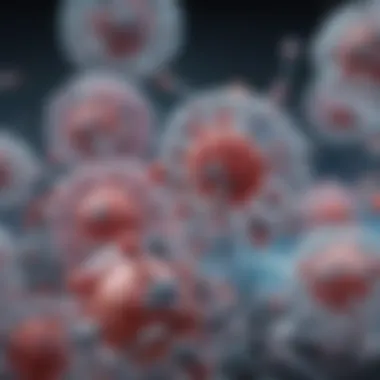
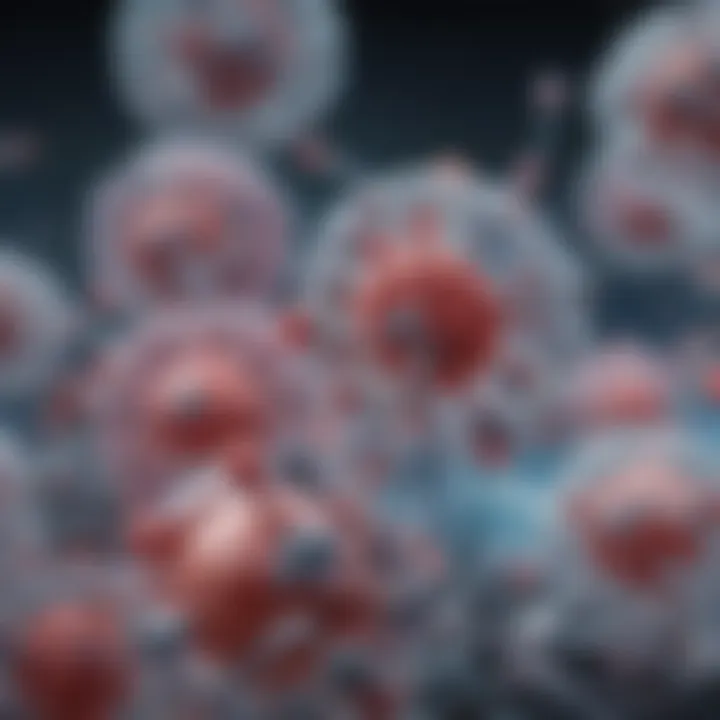
Intro
Anti-CD47 antibodies have emerged as a significant topic in the realm of biomedical research, particularly in cancer treatment and autoimmune diseases. CD47, a protein found on the surface of cells, plays a crucial role in the immune system. It acts as a "do not eat me" signal, preventing phagocytosis by macrophages. This mechanism, while protective for normal cells, often serves as a barrier for the immune system’s ability to eliminate cancerous cells effectively.
The focus on anti-CD47 antibodies has grown as researchers explore ways to disrupt this signal, enhancing the immune response against tumors. This exploration not only extends into oncology but also covers autoimmune diseases and regenerative medicine, highlighting the versatility of this approach. With a backdrop of recent clinical trials and ongoing research, the implications of anti-CD47 antibody therapies span multiple disciplines within medicine.
Research Overview
In order to provide a structured understanding, this section summarizes key findings related to anti-CD47 antibodies and outlines the primary research objectives that guide this field.
Summary of Key Findings
Research in anti-CD47 antibodies reveals several critical insights:
- They promote phagocytosis of cancer cells when bound to CD47, facilitating anti-tumor immunity.
- Clinical trials indicate promising results in patients with various malignancies, particularly hematologic cancers.
- The antibodies may also contribute to therapeutic strategies in autoimmune disorders by modulating the immune response.
- There is ongoing investigation into the role of anti-CD47 antibodies in promoting regeneration of tissues through their effects on macrophage behavior.
Research Objectives and Hypotheses
The main objectives guiding research on anti-CD47 antibodies include:
- To determine the efficacy of these antibodies in different types of cancer.
- To investigate their role in altering immune responses in autoimmune diseases.
- To explore their potential applications in regenerative medicine and tissue repair.
The underlying hypotheses suggest that targeting CD47 will enhance the body's natural immune responses against both malignant and non-malignant cells, opening avenues for new therapeutic strategies.
Methodology
Understanding the methodology is essential for evaluating the relevance and robustness of research findings in this field. This section describes the approaches utilized in studies on anti-CD47 antibodies.
Study Design and Approach
The studies often employ an array of experimental designs, including:
- In vitro studies to assess the basic mechanisms of action.
- Animal models for preliminary assessment of safety and effectiveness.
- Phase I and II clinical trials to evaluate the therapeutic potential in humans.
Data Collection Techniques
Data collection methods are diverse and can include:
- Flow cytometry for analyzing cell interactions and profiling immune responses.
- Immunohistochemistry for visualizing the expression of CD47 on tumor sections.
- Patient-reported outcomes to gauge the impact of therapies on quality of life.
Ongoing research aims to refine these techniques and further validate the use of anti-CD47 antibodies in clinical settings.
"The potential of anti-CD47 therapies lies in their ability to adapt to various medical conditions, making them valuable in both oncology and immunology."
The relevance of this research cannot be overstated, considering the pervasive challenges posed by cancer and autoimmune diseases in modern medicine. The following sections will delve deeper into the mechanisms at play, clinical applications, and future research directions on this promising frontier.
Prolusion to CD47
CD47, a transmembrane protein, has gained attention in biomedical research due to its crucial role in immune response and regulation. Understanding CD47 is fundamental when discussing anti-CD47 antibodies and their applications in various fields including oncology and autoimmune diseases. This section aims to unfold the significance of CD47 in the immune system, providing clarity on how its mechanisms contribute to immune evasion in cancer and other diseases.
What is CD47?
CD47 is a self-recognition molecule, often referred to as the "don't eat me" signal. It is expressed on many cell types, including red blood cells, and plays a vital role in maintaining homeostasis within the immune system. By binding to the signal-regulatory protein alpha (SIRPα) on macrophages, CD47 inhibits phagocytosis, enabling cells to evade elimination by the immune system. This property has significant implications as it allows for the survival of malignant cells, contributing to tumor progression.
The Role of CD47 in Immune Regulation
The regulation of immune responses by CD47 is a complex interplay that involves several components of the immune system.
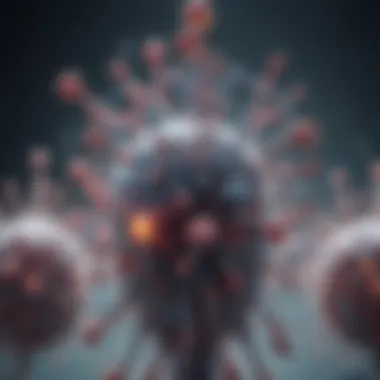
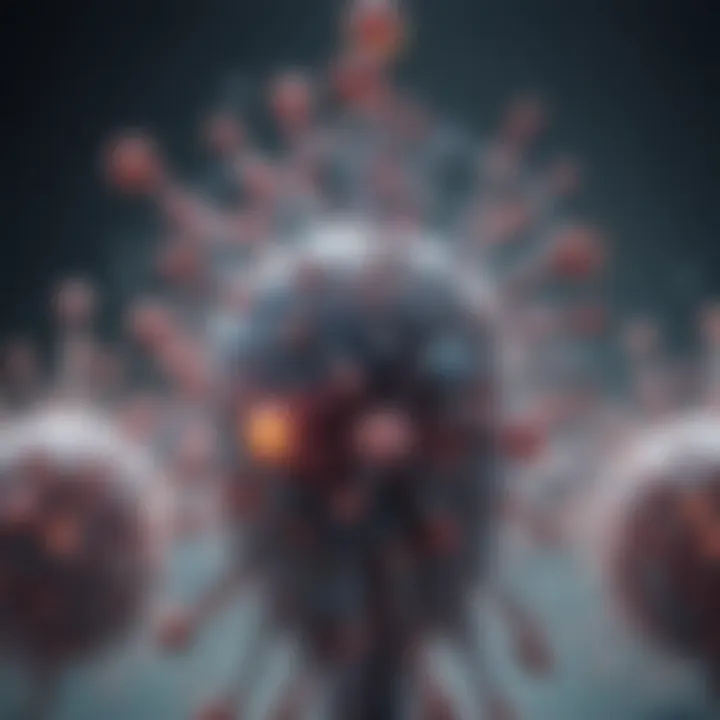
- Inhibition of Phagocytosis: As mentioned, CD47 prevents macrophages from engulfing cells, which is essential for the preservation of self-cells. This mechanism can be detrimental when cancer cells exploit it for immune evasion.
- Modulation of T-cell Responses: CD47 may also influence T-cell activity, promoting a state of immune tolerance, which is crucial in preventing autoimmunity but can contribute to the inability to mount an effective antitumor response.
- Influence on Dendritic Cells: CD47 interacts with dendritic cells, impacting their maturation and antigen-presenting capabilities, thus modulating the overall immune response.
Understanding the multifaceted role of CD47 in immune regulation is critical for developing therapies that can disrupt its actions, particularly in oncology, where targeting CD47 may enhance the immune system's ability to detect and eliminate cancerous cells.
"CD47 serves as a significant regulator of immunity, balancing between the need for self-preservation and the need for immune eradication of threats."
With this foundational understanding of CD47 in place, the article now progresses to examine anti-CD47 antibodies, their mechanisms of action, and their therapeutic potential.
Understanding Anti-CD47 Antibodies
Anti-CD47 antibodies are essential tools in modern biomedicine, particularly in the context of immunotherapy. Their significance lies in their ability to modulate immune responses, influencing the fate of cancerous and non-cancerous cells. By understanding these antibodies, researchers can better appreciate their transformative potential in therapeutic applications.
Mechanism of Action
The mechanism of action for anti-CD47 antibodies is based on their capacity to inhibit the interaction between CD47 and its receptor, signal regulatory protein alpha (SIRPα). This interaction is a crucial checkpoint that allows cancer cells to evade phagocytosis by immune cells.
When anti-CD47 antibodies bind to CD47, they block this signaling pathway. The result is an increased uptake of tumor cells by macrophages, facilitating a more robust immune response against tumors. This blockade has shown promise in preclinical and clinical studies, highlighting the potential of these antibodies in overcoming immune evasion mechanisms that many tumors exploit.
Types of Anti-CD47 Antibodies
Several types of anti-CD47 antibodies exist, each with unique characteristics that make them suitable for different therapeutic contexts. Their diversity allows researchers and clinicians to tailor treatments according to specific patient needs and tumor profiles.
Monoclonal Antibodies
Monoclonal antibodies are the most common form of anti-CD47 antibodies. They are derived from a single clone of immune cells, ensuring homogeneity in their structure and function. Akey characteristic of monoclonal antibodies is their high specificity, which reduces off-target effects. This makes them a popular choice, especially in clinical trials aimed at maximizing effectiveness while minimizing adverse reactions.
However, one disadvantage is that they can sometimes induce immunogenic responses in patients, potentially leading to reduced efficacy over time.
Bispecific Antibodies
Bispecific antibodies have been developed to simultaneously engage two different targets. This dual targeting mechanism allows for a more sophisticated approach to cancer therapy. The key characteristic of bispecific antibodies is their ability to direct immune cells toward the tumor more effectively, enhancing the immune response.
They offer the benefit of bridging the immune system and tumor cells, making them a promising choice for combination therapies. However, their complex structure can pose challenges in production and stability.
Conjugated Antibodies
Conjugated antibodies combine the targeting abilities of antibodies with therapeutic agents, such as toxins or radionuclides. The unique feature of these antibodies is their capability to deliver cytotoxic agents directly to tumor cells. This specificity maximizes the therapeutic effect while potentially reducing systemic toxicity.
Despite their advantages, the development of conjugated antibodies can be complicated due to the need to ensure stability and controlled release of the attached agent once inside the target cells.
"Understanding the different types of anti-CD47 antibodies is crucial for advancing cancer therapy and improving patient outcomes."
Finale
In summary, the exploration of anti-CD47 antibodies reveals a multifaceted approach to enhancing immune responses against cancers. Their mechanisms of action, types, and characteristics contribute significantly to their growing role in therapeutic strategies. Further research will continue to refine these antibodies, increasing their potential benefits across various medical applications.
Applications in Cancer Therapy
The applications of anti-CD47 antibodies in cancer therapy are a significant focus of current biomedical research. Cancer cells often exploit the CD47 mechanism to evade detection and destruction by the immune system. With the rise of immunotherapy, understanding how these antibodies can be effectively utilized provides new avenues for treatment. Their role in targeting tumor cells, enhancing the immune response, and the practical implementation witnessed in case studies illustrates the potential of these therapeutic strategies.
Targeting Tumor Cells
Anti-CD47 antibodies primarily target tumor cells that overexpress CD47, which acts as a "don’t eat me" signal. By blocking CD47, these antibodies enhance the ability of macrophages and other immune cells to recognize and phagocytize cancer cells. This action not only facilitates the direct elimination of tumor cells but also generates a robust immune response against the tumor microenvironment.
Specific studies have shown that tumors with high levels of CD47 display poorer responses to conventional therapies. This suggests that strategies focusing on CD47 could improve outcomes.
Key benefits of targeting tumor cells through anti-CD47 antibodies include:


- Increased Phagocytosis: Enhanced uptake of cancer cells by immune cells.
- Potential for Combination Therapy: When used with chemotherapy or checkpoint inhibitors, they can synergistically improve therapeutic efficacy.
- Broad Applicability: These strategies may be applied to a variety of cancer types, ranging from hematological malignancies to solid tumors.
Enhancing Immune Response
In addition to directly targeting tumor cells, anti-CD47 antibodies play a crucial role in modulating the immune system's overall response to cancer. By inhibiting CD47, these antibodies help awaken a dormant immune reaction against tumors. This process involves the recruitment and activation of both innate and adaptive immune cells, creating a more favorable environment for antitumor immunity.
Research indicates that the presence of anti-CD47 antibodies can lead to:
- Activation of Macrophages: These cells become more efficient in engulfing cancer cells, leading to the destruction of the tumor.
- Stimulation of T-cell Responses: Enhanced recognition and killing of tumor cells by T-lymphocytes.
- Cytokine Production: Increased levels of cytokines contribute to the overall immune response, further assisting in tumor eradication.
Case Studies in Oncology
The application of anti-CD47 antibodies is backed by various case studies that highlight their effectiveness in clinical settings. Certain trials have shown promising results for anti-CD47 therapies, showcasing a marked reduction in tumor size and improved patient survival rates.
For example, a study involving patients with acute myeloid leukemia demonstrated that treatment with anti-CD47 antibodies resulted in complete remission for a significant number of participants. Such outcomes suggest that these therapies can significantly alter the trajectory of treatment in some cases.
Additionally, trials with solid tumors have shown encouraging data, supporting the viability of anti-CD47 as a treatment option. As research continues, further insights will emerge about the best applications and combinations of these antibodies to maximize their efficacy.
Anti-CD47 antibodies represent a transformative approach in oncological therapeutics, leading to improved recognition of tumor cells by the immune system.
In summary, the applications of anti-CD47 antibodies in cancer therapy reveal a multi-faceted approach to targeting tumors and enhancing immune responses. With ongoing research and clinical trials, these strategies hold the promise of elevating cancer treatment to new heights.
Anti-CD47 Antibodies Beyond Oncology
The significance of anti-CD47 antibodies extends far beyond their primary applications in oncology. While much of the current research focuses on cancer therapies, emerging data suggests their potential in treating a variety of other diseases, notably autoimmune disorders and in regenerative medicine. This section explores the benefits and considerations relevant to these emerging applications, shedding light on their promising prospects across a broader biomedical landscape.
Role in Autoimmune Diseases
In autoimmune diseases, the immune system mistakenly targets and attacks the body’s own healthy cells. This misdirected immune response can lead to significant tissue damage and organ dysfunction. Anti-CD47 antibodies emerge as a novel strategy to mitigate these dysregulations. By blocking the interaction between CD47 and its receptor, SIRPα, these antibodies can decrease the phagocytosis of self-cells. This characteristic is crucial because it helps to restore balance in immune regulation.
Research indicates that the administration of anti-CD47 antibodies can potentially reduce the chronic inflammation seen in various autoimmune conditions. For instance, in models of rheumatoid arthritis and lupus, treatment with anti-CD47 antibodies has shown to decrease disease severity and improve clinical outcomes. Such findings pave the way for future clinical trials focusing on these therapies in human populations.
Potential in Regenerative Medicine
Regenerative medicine aims to repair or replace damaged tissues and organs. Here, anti-CD47 antibodies could play a critical role. Their ability to inhibit macrophage-mediated clearance allows for enhanced engraftment of stem cells or tissue-engineered constructs. In particular, given that many regenerative approaches rely on stem cells for repair, the introduction of anti-CD47 antibodies could significantly enhance their persistence and functionality in recipient environments.
Several studies are investigating how these antibodies could, for example, improve the survival rates of transplanted tissues or organ grafts. Moreover, in models of myocardial infarction or neurological injuries, anti-CD47 antibodies have been linked with improved healing outcomes, attributed to their ability to modulate immune responses favorably. This area represents a fertile ground for future investigations aimed at exploring the full extent of the therapeutic capabilities of anti-CD47 antibodies in regenerative contexts.
The use of anti-CD47 antibodies is a promising area of research that could lead to breakthroughs in treating autoimmune diseases and enhancing regenerative medicine approaches.
In summary, while primarily recognized for their role in cancer therapy, anti-CD47 antibodies present exciting opportunities in autoimmune diseases and regenerative medicine. Continued research into these areas is critical, not only to expand their applicability but also to enhance our understanding of the underlying immune mechanisms at play.
Current Research and Clinical Trials
Current research and clinical trials are crucial in understanding the potential of anti-CD47 antibodies in therapeutic applications. This section examines the progress made in the field, focusing on the design and execution of clinical trials with their outcomes. The insights gained from these studies are vital for refining treatment strategies and optimizing anti-CD47 therapies.
Overview of Recent Trials
Several recent trials have explored the efficacy of anti-CD47 antibodies in different therapeutic contexts. One notable phase I trial involved the use of the monoclonal antibody Hu5F9-G4 in patients with various solid tumors. The primary objective was to assess safety and tolerability while evaluating preliminary efficacy. The results exhibited promising signs of anti-tumor activity with manageable side effects, paving the way for subsequent studies.
In another significant trial, the combination of anti-CD47 therapy with chemotherapy demonstrated a synergistic effect in hematological malignancies. This combination was found to enhance the body’s immune response against cancer cells while reducing potential resistance mechanisms often observed in monotherapy.
Moreover, trials involving bispecific antibodies, like ABBV-181, revealed intriguing results. These agents target CD47 alongside another tumor-associated antigen, aiming to intensify the immune response while potentially mitigating adverse responses associated with single-target therapies.
Outcomes and Findings
The outcomes from these trials underline several key findings.
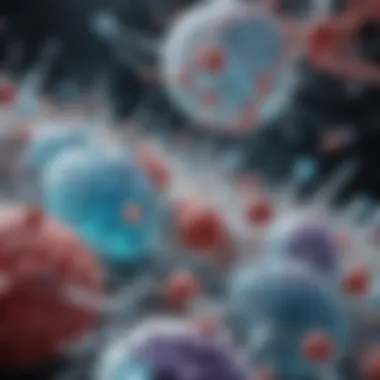
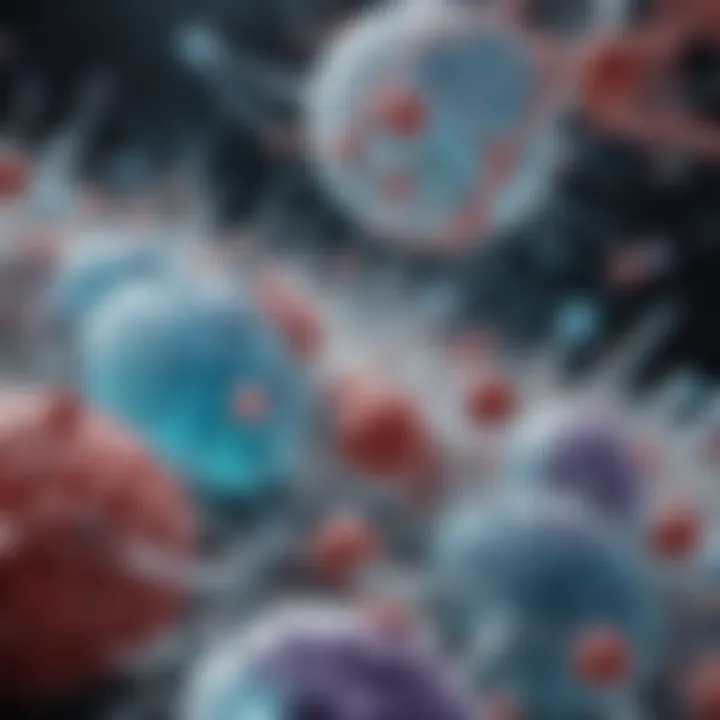
- Efficacy in Different Cancer Types: Anti-CD47 antibodies exhibited effectiveness across a range of malignancies. Results suggested improved patient outcomes, particularly in recurrent or resistant cancers.
- Safety Profile: The trials generally reported a favorable safety profile, with most adverse effects classified as mild to moderate. Serious adverse events were rare but underline the need for cautious monitoring in ongoing studies.
- Immune Activation: Enhanced immune activation was a recurrent theme among trials, with indicators showing increased phagocytosis of tumor cells. This aligns with the proposed mechanism of anti-CD47 antibodies, further affirming their potential.
"The progress in the research and outcomes of current trials highlight the therapeutic promise of anti-CD47 antibodies in oncology treatments."
Overall, these findings fuel enthusiasm for further exploration and development of this class of antibodies. Continued clinical trials will be essential in confirming these initial results and determining long-term benefits for patients.
Challenges in Development
The development of anti-CD47 antibodies presents a variety of challenges that must be addressed to optimize their therapeutic potential. Understanding these challenges is crucial for advancing both research and clinical applications. The hurdles are not just technical but also involve understanding the complex interactions between anti-CD47 antibodies and the immune system, as well as the broader implications for patient safety and treatment efficacy.
Immune Evasion Mechanisms
One significant challenge in employing anti-CD47 antibodies is the presence of immune evasion mechanisms that tumors may leverage. Tumors can adapt by upregulating surface proteins that inhibit immune recognition. For instance, cancer cells often express increased levels of CD47, which acts as a "don’t eat me" signal to macrophages. This mechanism prevents immune cells from targeting and destroying malignant cells.
Furthermore, other immune checkpoint proteins may work in tandem with CD47 to create an effective shield against immune responses. As researchers design anti-CD47 therapies, they must consider this immunological complexity and explore potential combinations with other therapeutic agents that also target these evasive pathways.
Safety and Efficacy Concerns
Safety and efficacy are paramount in the development of any therapeutic agents, and anti-CD47 antibodies are no exception. One major concern lies in the potential for on-target, off-tumor effects. While the goal is to target cancer cells, there is a risk of affecting normal cells that also express CD47. The consequences can range from minor adverse effects to more serious immune-related diseases.
In addition, the biological variability among patients may lead to differences in response to treatment. Not every patient will benefit equally from anti-CD47 therapies, adding layers of complexity regarding dosing strategies and patient selection for clinical trials.
The development of anti-CD47 antibodies must balance effectiveness against cancer while minimizing adverse effects to normal tissues.
Future Directions
The future of anti-CD47 antibodies holds significant potential in both therapeutic and research contexts. Understanding the trajectory of this field is crucial for fostering more effective treatment options and advancing knowledge in immunology. As research continues unfurling, several primary elements emerge that offer insights into future innovations and applications.
Innovations in Therapeutic Design
Innovative approaches in the design of anti-CD47 antibodies are vital. This involves refining the molecular structure to enhance efficacy and minimize adverse effects. For instance, utilizing advanced protein engineering techniques can yield antibodies with improved binding affinity to the CD47 target. Such innovations might also involve incorporating nanotechnology, enabling targeted delivery mechanisms that increase local concentrations of the antibodies at tumor sites without affecting surrounding healthy tissues.
- Efforts are underway to create bispecific antibodies that can bind simultaneously to CD47 and other co-stimulatory checkpoints.
- Additionally, optimizing the glycosylation patterns on antibodies can influence their durability in circulation and their ability to elicit immune responses.
- Exploring the synergy of anti-CD47 antibodies with other immunotherapeutic modalities, such as checkpoint inhibitors, might prove beneficial.
These innovations are not merely academic; they are essential for translating laboratory findings into impactful clinical outcomes.
Expanding Applications
The scope of anti-CD47 antibody applications is far-reaching. Beyond oncology, their use in autoimmune diseases and regenerative medicine is being explored vigorously. In autoimmune conditions, anti-CD47 antibodies could help retrain the immune system to tolerate self-antigens. This avenue may provide novel treatments for disorders like systemic lupus erythematosus and rheumatoid arthritis, where immune dysregulation is a hallmark.
In regenerative medicine, anti-CD47 antibodies have the potential to promote tissue repair and regeneration by modulating macrophage activity. The macrophages play a crucial role in tissue homeostasis and repair, and their regulation by anti-CD47 antibodies can aid in recovery from injuries or degenerative diseases.
- Clinical trials are increasingly focusing on these non-oncology applications, which serve to broaden the impact of anti-CD47 strategies.
- Detailed exploration of combination therapies, where anti-CD47 antibodies are paired with existing treatments, could enhance efficacy and broaden the patient population that benefits from such therapies.
The potential of anti-CD47 antibodies stretches beyond their initial applications in cancer research, promising a future of practical utility across various health disciplines.
Overall, the future directions of anti-CD47 antibodies emphasize the need for innovation and adaptability. By exploring novel treatment pathways and expanding their applications, researchers can unlock previously unseen therapeutic potential.
Ending
The conclusion of this article on anti-CD47 antibodies synthesizes the key findings and insights into this area of biomedical research. Understanding the mechanisms and applications of these antibodies is crucial for progressing therapies, particularly in cancer, autoimmune diseases, and beyond. The information presented highlights not just the therapeutic potential but also the limitations and challenges these antibodies face in clinical settings.
Summary of Findings
Throughout this article, we explored the diverse roles anti-CD47 antibodies play in modulating immune responses. Key points include:
- Mechanisms of Action: Anti-CD47 antibodies work by disrupting the inhibitory signals that suppress immune responses against tumor cells.
- Clinical Applications: Their potential in both oncology and autoimmune disorders shows a broad applicability that is expanding with research.
- Research Landscape: Current clinical trials demonstrate safety, efficacy, and dosing strategies, although challenges remain regarding immune evasion and safety concerns.
This summary encapsulates a significant realm of ongoing research, where anti-CD47 antibodies lead the charge towards innovative treatment strategies.
Final Thoughts
"The development of anti-CD47 antibodies marks a pivotal moment in therapeutic innovation, but it is the ongoing research that will determine how far we can go in treating challenging medical conditions."















